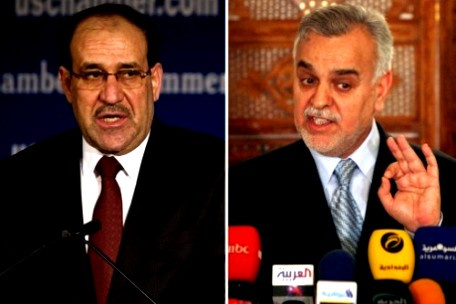Maliki Needs to Be Extra Vigilant

Predictably, after the evacuation of US forces, Iraq is undergoing a political crisis. Following years of Saddam’s dictatorship, a great barrier has been fashioned against the formation of a developed civil society, paralyzing the activities of elite figures in the country’s politics. With the fall of Saddam and the breakdown of his political barrier, many political figures are seeking electoral posts within the government that they feel is rightfully theirs.
The opposition to Saddam, including the Shia’s, Sunnis, armed Arabs, and Kurds, formed fronts inside and outside Iraq. With Saddam’s fall and the collapse of the Ba’ath party, a power vacuum was formed, opening up opportunities for the previously suppressed opponents. However, these groups are still politically inexperienced. In many cases, they are rallying against each other, creating deep political divisions. However, during this political turmoil, two major movements have aimed to keep a balanced approach by trying to resolve differences. One is the US and the other is the party led by Grand Ayatollah Ali al-Sistani.
Americans intend to support their allies in Iraq by operating in favor of political movements that are close to Washington. However, the Grand Ayatollah’s intentions are different. While maintaining national unity in mind, Ayatollah Sistani attended many political debates and according to western political pundits, every dispute that he participated in concluded in the best possible way-- often in the harnessing the best interests of different Iraqi political groups.
Yet during the past months, Ayatollah Sistani and other Najaf religious figures have been absent from Iraq’s political scene. They are not even permitting Iraqi officials to visit them. Perhaps they had predicted such days.
Either way, the American troops have left Iraq and while they may have thousands of security forces placed in the US embassy, they lack the necessary military force to influence Iraq’s internal affairs. Due to these conditions, once again a political crisis has risen in Iraq. Nouri al-Malaki’s judiciary system has pressed charges on Vice President Tariq al-Hashimi and on Saleh al-Mutlaq. Both these personalities are prominent Sunni figures and members of the Al-Iraqiya Coalition. Al-Iraqiya is a movement close to the US and the attack on of two of its prominent figures is a sort of attack on this US-backed party.
Al-Hashimi, who is accused of involvement in terrorist acts, is now seeking refuge in the Kurdistan region. He has mentioned that he is willing to be prosecuted in Ardabil and under the supervision of Arab league representatives.
Massive explosions in Baghdad have sent clear signals to the Iraqi administration. The US and its Arab allies want to send a message to the Iraqi administration that they are willing to once again cause instability in Iraq if the government insists on eliminating US support. Maliki however, is taking a firm stand and has warned autonomous Kurdish officials to hand over Tariq al-Hashemi to the central government.
Currently the US is engaged in its own presidential campaigns and the Arab league is in conflict with Syria. Perhaps this could explain Iraq’s current political struggle. Yet the question is who will be responsible if Iraq’s governing board miscalculates and the country enters another period of chaos? Will the public hold the US and it Arab allies responsible? This does not seem to be the consequence, and the current government of Iraq will take the blame for any kind of disorder, especially with the absence of American troops in Iraq.
For these reasons Maliki’s administration must be cautious and vigilant, as he will take the blame for any Iraqi misfortune. Possible chaos in Iraq has become Maliki’s first concern, and if he doesn’t show political strength in overcoming current problems in Iraq, he could end up as the victim.

